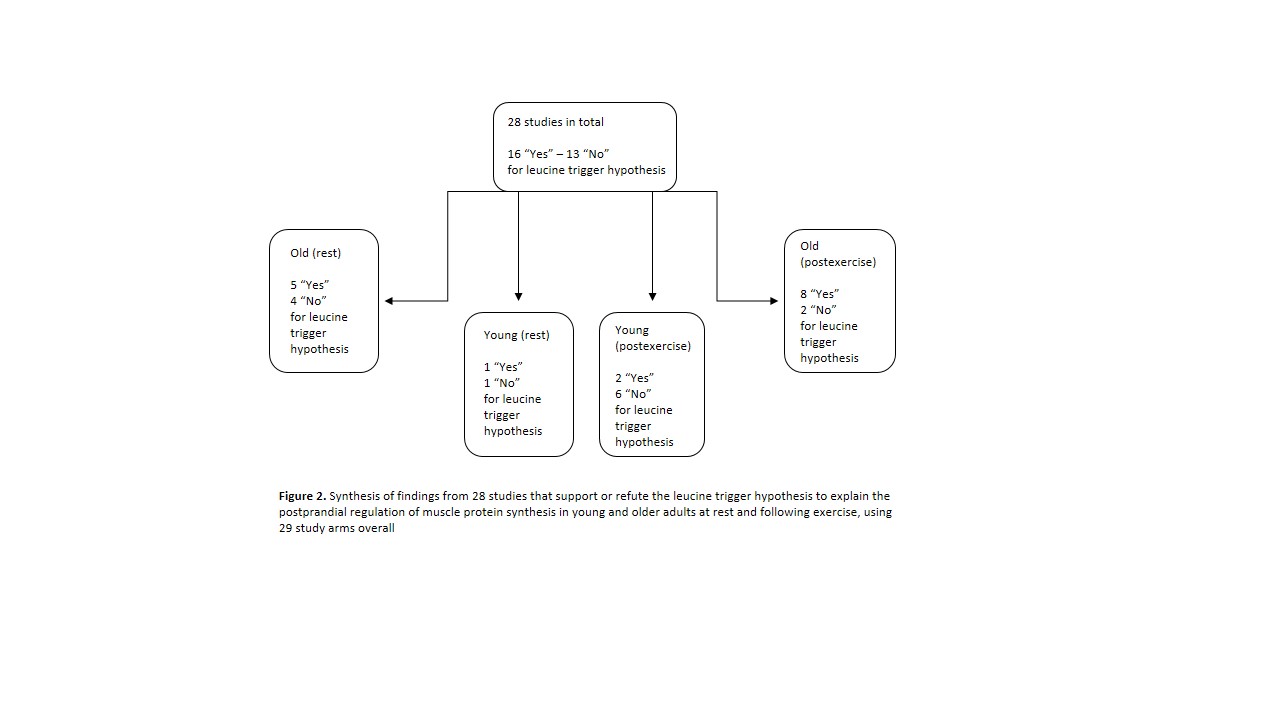Background: The ‘leucine trigger’ hypothesis was originally conceived to explain the postprandial regulation of muscle protein synthesis (MPS). This hypothesis implicates the magnitude (amplitude and rate) of postprandial increase in blood leucine concentrations for regulation of the magnitude of MPS response to an ingested protein source. Recent evidence from experimental studies has challenged this theory, with reports of a disconnect between blood leucine kinetics and postprandial rates of MPS in response to protein ingestion. Aim: The primary aim of this systematic review was to qualitatively evaluate the leucine trigger hypothesis to explain the postprandial regulation of MPS at rest and post-exercise in young and older adults. We hypothesized that experimental support for the leucine trigger hypothesis will depend on age, exercise status (rest vs. post-exercise), and protein source (i.e. isolated proteins vs. protein-rich whole food sources). Methods: This qualitative systematic review extracted data from studies that combined measurements of postprandial blood leucine kinetics and rates of MPS following ingested protein at rest and following exercise in young and older adults. Data relating to blood leucine kinetics and postprandial MPS rates were extracted from all studies and reported as providing sufficient or insufficient evidence for the leucine trigger hypothesis. Results: Overall, 16 of the 28 eligible studies provided sufficient evidence to support the leucine trigger hypothesis for explaining divergent postprandial rates of MPS in response to different ingested protein sources. Of these 16 studies, 13 were conducted in older adults (eight of which conducted measurements post-exercise) and 14 studies included the administration of isolated intact protein. Conclusion: This systematic review underscores the merits of the leucine trigger hypothesis for the explanation of the regulation of MPS. However, our data indicate that the leucine trigger hypothesis confers most application in regulating the postprandial response of MPS to ingested proteins in older adults. Consistent with our hypothesis, we provide data to support the idea that the leucine trigger hypothesis is more relevant within the context of ingesting isolated protein sources rather than protein-rich whole foods. Future mechanistic studies are warranted to understand the complex series of modulatory factors beyond blood leucine kinetics within a food matrix that regulate postprandial rates of MPS.
Physiology 2021 (2021) Proc Physiol Soc 48, PC041
Poster Communications: Evaluating the leucine trigger hypothesis to explain the postprandial regulation of muscle protein synthesis in young and older adults: A systematic review
Gabriele Zaromskyte1, Konstantinos Prokopidis2, Theofilos Ioannidis1, Kevin D Tipton3, Oliver C Witard4
1 Department of Nutritional Sciences, King’s College London, London, United Kingdom, United Kingdom 2 Institute of Life Course and Medical Sciences, University of Liverpool, Liverpool, United Kingdom 3 Institute of Performance Nutrition, London, United Kingdom, United Kingdom 4 Centre for Human and Applied Physiological Sciences, Faculty of Life Sciences and Medicine, King’s College London, London, United Kingdom, United Kingdom
View other abstracts by:
Where applicable, experiments conform with Society ethical requirements.


